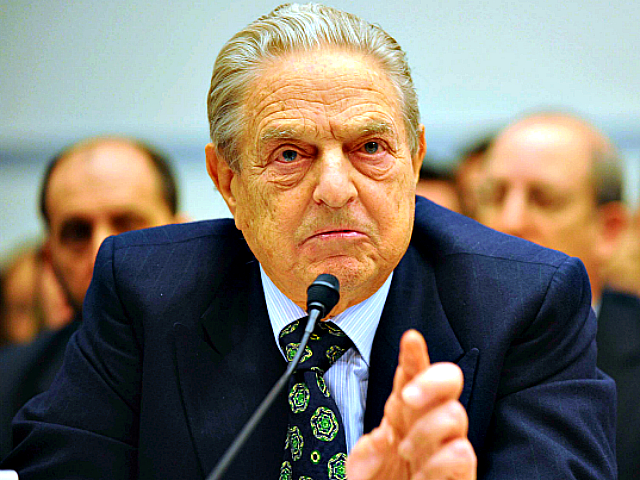The progressive billionaire speculator George Soros has said he will ‘fight back’ against the “dominant ideology” of nationalism, whilst admitting that favoured globalist project the European Union is “on the verge of a breakdown”.
Wistfully writing that Soros’s Open Society Foundations (OSF) once ‘epitomised the optimism about the spread of Western-style democracy’ after the fall of the Soviet Union, the Financial Times described the scrutiny the global progressive body is experiencing amidst a wave of patriotism and populism and the ‘wilting’ attraction of the leftist agenda.
Soros, alluding to the collapse of the USSR, told the left-liberal newspaper: “It’s déjà vu all over again with one big change — the dominant ideology in the world now is nationalism… It’s the EU that’s the institution that’s on the verge of a breakdown.
“And Russia is now the resurgent power, based on nationalism,” Soros said.
The open borders financier blames Russian hackers for attacks against him in 2016, and the country’s government blacklisted the OSF in 2015 for allegedly “endangering Russia’s constitutional system and national security”.
The 87-year-old had considered winding down the OSF before his death but seeing the rise of the world’s citizenry against globalism and progressive interests, transferred $18 billion of his own wealth into the fund in October 2017 and pledges to stay on as chairman for another five years – or longer.
“I think you can say I’m quite lucky with my enemies,” Soros said. “It makes me feel more than ready to fight back and stand up for what is right.”
The concept of “what is right” is fluid for the billionaire, depending on his financial stake. The speculator, who ‘broke the Bank of England’ by short selling sterling in 1992, described himself as “one person who at one time engages in amoral activity and the rest of the time tries to be moral” in a 1998 60 Minutes interview where he attempted to rationalise his waves of destruction on sovereign nations through his speculating with his ‘philanthropy’.
Soros has denied accusations his organisations were directly involved in toppling governments in Ukraine, Macedonia, and Georgia, though admitted to the Financial Times that his grantees were involved in the 2014 Maidan protests in Ukraine, saying: “We were not involved in the actual fighting — that’s against our guidelines and principles. But we were supporters of the fighters and that was also during Maidan.”
In Macedonia, vice president of the Stop Operation Soros organisation Cvetin Chilimanov accused OSF of organising protests in the Balkans.
Central European nations have been vocal opponents of Soros’s interventions, and the billionaire is believed by the Hungarian government to be behind the EU’s plans to open the bloc’s borders to millions of Middle Eastern and African people through the institutionalisation of mass migration.
Last week at a European Parliament hearing, Soros–backed migrant rights group the Hungarian Helsinki Committee and the Helsinki Foundation for Human Rights in Poland urged the European Parliament to establish a “European Values Instrument” which would financially support NGOs that are ‘protecting European values’ in member states.
The hearing was organised by European lawmakers Sophie in’t Veld and Frank Engel – both of whom are named as two of the 226 “reliable allies” of Soros’s Open Society European Policy Institute in the European Parliament.
